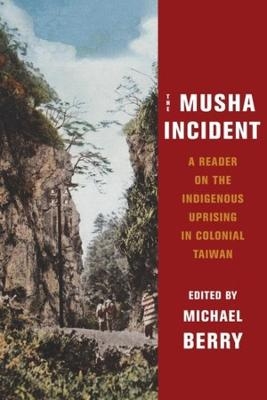
The Musha Incident
Columbia University Press (Verlag)
978-0-231-19747-2 (ISBN)
Over the ensuing decades, the Musha Incident became seen as a central moment in Taiwan’s colonial history, and different political regimes and movements have seized on it for various purposes. Under the Japanese, it was used to attest to the “barbarity” of Taiwan’s indigenous tribes; the Nationalist regime cited the uprising as proof of the Taiwanese peoples’ heroism and solidarity with the Chinese in resisting the Japanese; and pro-independence groups in Taiwan have portrayed the Seediq people and their history as exemplars of Taiwan’s “authentic” cultural traditions, which stand apart from that of mainland China.
This book brings together leading scholars to provide new perspectives on one of the most traumatic episodes in Taiwan’s modern history and its fraught legacies. Contributors from a variety of disciplines revisit the Musha Incident and its afterlife in history, literature, film, art, and popular culture. They unravel the complexities surrounding it by confronting a history of exploitation, contradictions, and misunderstandings. The book also features conversations with influential cultural figures in Taiwan who have attempted to tell the story of the uprising.
Michael Berry is professor of modern Chinese literature and film at the University of California, Los Angeles. His books include Speaking in Images: Interviews with Contemporary Chinese Filmmakers (2005) and A History of Pain: Trauma in Modern Chinese Literature and Film (2008), and he is the translator of several novels, including Chang Ta-chun’s Wild Kids: Two Novels About Growing Up (2000) and Wu He’s Remains of Life (2017), all from Columbia University Press.
A Note on Romanization
Acknowledgments
Introduction: Approaching Musha, by Michael Berry
Part I. Historical Memories of Musha
1. The Discourse and Practice of Colonial “Suppression” in the Making of the Musha Rebellion and Its Aftermath, by Toulouse-Antonin Roy
2. The Musha Incident and the History of Tgdaya-Japanese Relations, by Paul D. Barclay
3. Relistening to Her and His Stories: On Approaching “The Musha Incident from an Indigenous Perspective,”by Kae Kitamura
Part II. Literary Memories of Musha
4. Bodies and Violence in the Musha Incident, by Robert Tierney
5. Musha Incident, Incidentally: Tsushima Yūko’s Exceedingly Barbaric, by Leo Ching
6. Satō Haruo on the Musha Incident, by Ping-hui Liao
7. Untimely Meditations: The Contemporary, the Philosophy of Walking, and Related Ethical Matters in Remains of Life, by Chien-heng Wu
Part III. Visual and Digital Memories of Musha
8. The Face of the Inbetweener: The Image of Indigenous History Researchers as Reflected in Seediq Bale, by Nakao Eki Pacidal
9. Quest for Roots: Trauma and Heroism in Wu He’s Yusheng and Tang Shiang-Chu’s Yusheng: Seediq Bale, by Darryl Sterk
10. Historical Representation in an Age of Wiki Writing and Digital Curation: The Musha Incident on Digital Platforms, by Kuei-fen Chiu
Part IV. Musha in Cultural Dialogue
11. Fiction and Fieldwork: In Conversation with Wu He on Remains of Life, by Michael Berry
12. Heavy Metal Headhunt: An Interview with Chthonic’s Freddy Lim, by Michael Berry
13. Televising the Musha Incident: Wan Jen on the Miniseries Dana Sakura, by Michael Berry
14. No Good Guys or Bad Guys: An Interview with Wei Te-sheng, by Tony Rayns (translated by Christa Chen)
Contributors
Index
| Erscheinungsdatum | 21.03.2022 |
|---|---|
| Reihe/Serie | Global Chinese Culture |
| Zusatzinfo | 16 images |
| Verlagsort | New York |
| Sprache | englisch |
| Maße | 152 x 229 mm |
| Themenwelt | Geisteswissenschaften ► Geschichte ► Allgemeine Geschichte |
| Geisteswissenschaften ► Geschichte ► Regional- / Ländergeschichte | |
| Geschichte ► Teilgebiete der Geschichte ► Wirtschaftsgeschichte | |
| ISBN-10 | 0-231-19747-0 / 0231197470 |
| ISBN-13 | 978-0-231-19747-2 / 9780231197472 |
| Zustand | Neuware |
| Haben Sie eine Frage zum Produkt? |
aus dem Bereich


